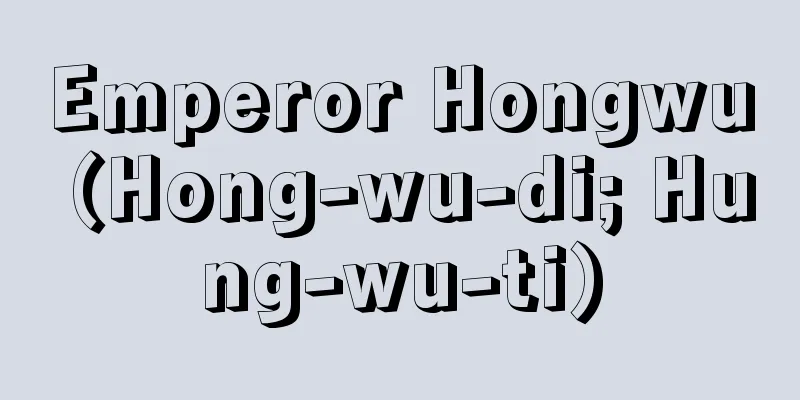Emperor Hongwu (Hong-wu-di; Hung-wu-ti)

|
Born in 1328 in Australia [Died] Hongwu 31 (1398), Nanjing. The first emperor of the Ming dynasty in China (reigned 1368-98). His given name was Zhu Yuanzhang, and his temple name was Taizu. Born to a poor farmer, he was orphaned at a young age and lived as a begging monk, but later rose to prominence as a subordinate of the Red Turban Army's general, Guo Zixing. He occupied Nanjing, the Yuan dynasty's base in Jiangnan, and called himself King of Wu. He then defeated various warlords in various regions to establish the Ming dynasty (1368), and established the Yuan dynasty together with Hongwu. At the same time, he drove the Yuan dynasty out of China and unified it by expelling it from the Mongols. He made it his policy to restore the Han dynasty and return it to the rule of the Han and Tang dynasties, but he was not simply a restorationist, and aimed to establish an imperial dictatorship. In the central government, in Hongwu 13 (1380), he abolished the Secretariat and made the six ministries independent, and established the Ducayuan (inspection) and the Five Army Commanderies (military), which were directly subordinate to the emperor. Even in the provinces, the three powers of the Fuzhengshisi (administration), Duzhengshisi (military), and Anzashisi (inspection) were separated and each was directly connected to the central government, and the emperor held immense power on top of this governing system. He also gave fiefs to his sons in key locations throughout the country to protect the empire. On the other hand, he established the Lijia system to govern the peasants, and had them create the Fuyue Huangzhu and Yulin Tuzhu to ensure the collection of taxes and labor, and to infiltrate politics. However, his institutional reforms aimed at strengthening the emperor's dictatorial power were realized through the purge of meritorious officials through the Hu Weiyong and Lanyu Prisons, and a reign of terror using a spy organization centered on the Jinyiwei, and he killed as many as 100,000 people in his lifetime. As a result, the emperor's power became immense, but in his later years, he outlived Crown Prince Biao and died alone from illness. Source: Encyclopaedia Britannica Concise Encyclopedia About Encyclopaedia Britannica Concise Encyclopedia Information |
|
[生]天暦1(1328).濠州 [没]洪武31(1398).南京 中国,明の第1代皇帝 (在位 1368~98) 。姓名は朱元璋,廟号は太祖。貧農の子に生まれ,若くして孤児となり托鉢僧をして暮らしたが,のち紅巾軍の部将郭子興の部下となって頭角を現した。元の江南の拠点南京を占領,呉王と称し,さらに各地の群雄をくだして明朝を建て (1368) ,洪武と建元し,同時に元をモンゴルに駆逐して中国を統一。漢民族王朝を回復して漢,唐の治世に返ることを旗印にしたが,単なる復古主義ではなく皇帝独裁体制の確立を目指した。中央では洪武 13 (1380) 年中書省を廃止して六部を独立させ,都察院 (検察) ,五軍都督府 (軍事) をおき,これらを皇帝に直属させた。地方でも布政使司 (行政) ,都指揮使司 (軍事) ,按察使司 (検察) の3権を分立しておのおのを中央に直結し,皇帝はこの統治機構の上に立って絶大な権力を握った。また皇子たちを全国の要地に分封し,帝国の防護にあたらせた。一方農民統治策としては里甲制を設け,賦役黄冊や魚鱗図冊をつくらせて租税,力役の徴収を確実にし,政治の浸透をはかった。しかし皇帝独裁権の強化を目指す彼の制度改革は胡惟庸,藍玉の獄などによる功臣の粛清や,錦衣衛を中心とするスパイ組織を使った恐怖政治によって実現したのであって,彼は一代で 10万人もの人を殺した。その結果,皇帝権は絶大となったが,晩年は皇太子標にも先立たれ,孤独のうちに病没した。 出典 ブリタニカ国際大百科事典 小項目事典ブリタニカ国際大百科事典 小項目事典について 情報 |
Recommend
Feldspar (English spelling)
It is the most abundant mineral in the earth'...
One character, one stone sutra - Ichiji Issekikyo
These are Buddhist scriptures written one characte...
Public official - Kujiyaku
〘Noun〙 Miscellaneous taxes of the Middle Ages. In ...
Ecruz, JC - Ecruz
…In the 1960s, information science research into ...
Jahrmarkt
… The cities that were established in Western Eur...
Mount Goken
This mountain is located in the north-central par...
Kakiuchi style village - Kaito toshikisonraku
…Following German settlement geography, in 1913 T...
Gallipoli
Gallipoli is a peninsula in northwestern Turkey t...
Karel-Dekin method
…Received the Nobel Prize in Physiology or Medici...
Ceratobatrachus guentheri (English spelling) Ceratobatrachusguentheri
…Unusually aggressive for a frog, they will even ...
Ingushetiya
...The capital is Nazran'. The region is call...
Exclusivist
…However, since parolees, as well as prisoners wh...
Berlichingen - Götz von Berlichingen
A knight during the German Reformation. Born in J...
Perfect number
When the sum of the divisors of a natural number ...
Gardening
…Horticulture is a word that has been used since ...



![Tachikawa [town] - Tachikawa](/upload/images/67cc21c74138b.webp)





